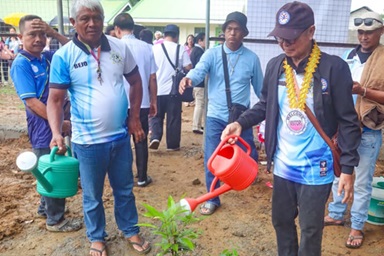Filling coolers of ice, loading trucks with diapers and chain saws and cooking community “cleaning out the freezer” dinners are some of the ways United Methodists in Florida are responding to their neighbors left devastated by Hurricane Irma.
Florida Area Bishop Kenneth H. Carter Jr. and a conference assessment team made a 325-mile roundtrip across the peninsula of Florida and along U.S. Highway 27 on Sept. 13 to pray with residents and listen to stories of survival and loss from Hurricane Irma.
how to help
United Methodists wishing to help can make donations directly through UMCOR’s Domestic Disaster Response Advance #901670.
Churches and individuals also can assemble cleaning buckets. Here is how.
“We heard testimonies of broken people who are already feeding hundreds in their communities. At times, it was honest and raw. At times it was healing and almost hopeful,” Carter said.
Michele Garrett, on staff at Suntree United Methodist Church in Melbourne, Florida, couldn’t hold back the tears as she talked about her church loading up a 20-foot truck to send to two United Methodist congregations in the Florida Keys.
Suntree has a special connection to Big Pine Key and Key West United Methodist churches. The Revs. John and Terri Hill, who lead those churches, are former pastors of Suntree. The Florida Keys were hard hit and people are just being allowed back into the area.
“I was bawling my eyes out when they closed the truck,” Garrett said. “Every single inch of that truck was packed. We had to put some stuff in the dining hall.”
Garrett said the outpouring of the community — mostly United Methodist churches in the area — was astounding since the only way they communicated the need for supplies was through Facebook.
“People wanted a way to express their love and support,” she said. “My house is fine. I barely lost power and I have zero damage.”
Giving was a way to be useful, she said.
Garrett told the story of one family who were on their way back to Miami when they heard about what Suntree was doing.
“They had evacuated to Georgia and were on their way back home. They pulled off the road and went to Target and dropped stuff off. They were part of the evacuation and they don’t even know what they are going home to — but they made sure to donate.”
The church also has a huge icemaker and they gave out coolers of ice to anyone who came to the building.
Jan Marie Etzel, who is on the leadership team at Cornerstone United Methodist Church in Naples, Florida, is without power, though her home is undamaged.
She said her neighborhood of Ibis Cove Circle is diverse with many different cultures and ethnicities but until the storm, many did not really talk to each other.
Etzel manages the church’s large community garden, which includes 197 tropical fruit trees. And she had plenty of frozen vegetables in her freezer. When she saw her neighbor across the street fire up his grill, she and other neighbors starting bringing over food from their freezers.
“Everybody came over and other people brought grills. Instead of losing the food we used it to feed each other,” she said. “The meal was incredible because it brought us all together and the flavors were just amazing.”
Carter said he was in awe of the courage and faith he saw in people whose lives were devastated.
“We met with pastors and lay leaders. We prayed in English and Spanish. We saw homes surrounded by water and sanctuaries drenched by the flood. We stood with people who have no clean water, no electricity, no internet access and no air conditioning. Some have no immediate prospects for any of this,” he said.
The bishop and a conference assessment team traveled from Lakeland to Naples to Immokalee to Sebring back to Lakeland on Sept. 13.
“We basically followed the path of Hurricane Irma’s landfall onto the peninsula of Florida and its path along the U.S. Highway 27 Corridor, one of the most impoverished regions of our conference,” Carter said.
The assessment team included the Rev. Alex Shanks, assistant to the bishop; Pam Garrison, disaster response coordinator; the Rev. Clarke Campbell-Evans, director of missional engagement; and the Rev. Rini Hernandez, district superintendent of the South West district.
Etzel said she has been meditating on all that has happened since the hurricane hit. “I am grateful for the storm because it really teaches a lot of lessons.”
Gilbert is a multimedia reporter for United Methodist News Service. Contact her at 615-742-5470 or [email protected]. To read more United Methodist news, subscribe to the free Daily or Weekly Digests.
Like what you're reading? Support the ministry of UM News! Your support ensures the latest denominational news, dynamic stories and informative articles will continue to connect our global community. Make a tax-deductible donation at ResourceUMC.org/GiveUMCom.








